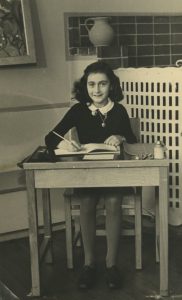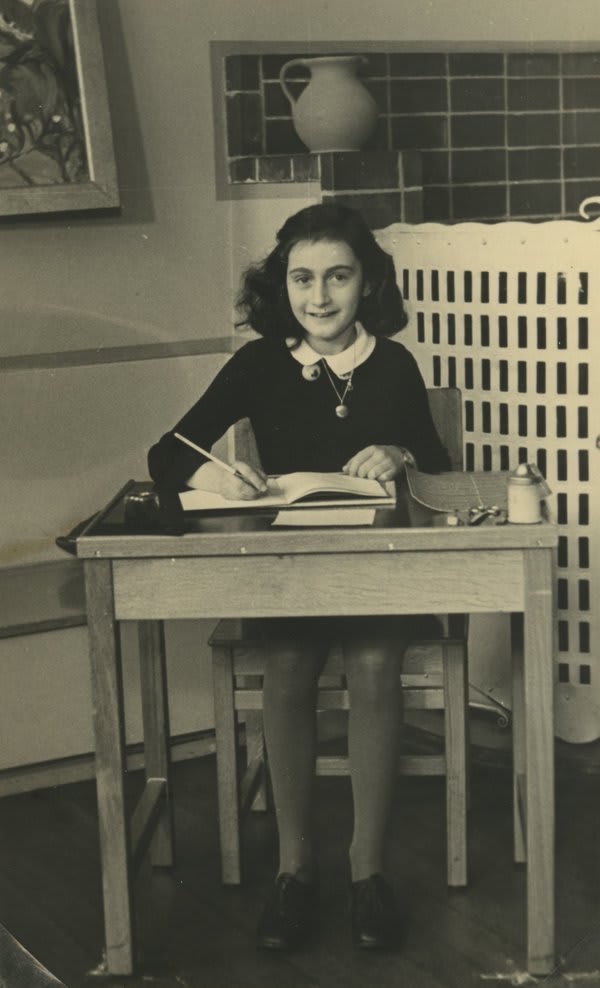
There’s only one article about Anne Frank on the OU website (well, two now, including this one). It’s from 2012, so it’s not even new, but you would not believe the traffic this article sees – and the questions it generates! It’s not even on OU Torah (the section of the OU web site that I manage) but I answer maybe five Anne Frank questions every week, almost always referred by this page. (The most common by far is “When did Anne Frank die?” 1945.)
I’ve had people tell me they’re studying Judaism and so far they’ve covered Shabbos, holidays and Anne Frank, like she’s a pillar of Judaism.
Sometimes we get trolls on the web site. They figure an easy target is to make fun of Anne Frank. That’s classless but, again, it’s not like she’s a pillar of our faith.
So what is it about Anne Frank that makes people attribute so much importance to her?
It’s not just us. I did a little research and Anne Frank is surprisingly ubiquitous.
At least half a dozen bands have referenced Anne Frank in their lyrics, including Outkast (“You’re so Anne Frank/ Let’s hit the attic and hide out for two weeks”) and an entire album by Neutral Milk Hotel, In the Aeroplane Over the Sea (“The only girl I ever loved/ Was born with roses in her eyes/ But then they buried her alive/ One evening, 1945,” “I wish I could save her/ In some sort of time machine,” etc.). There’s even a punk rock band named Anne Frank on Crank. According to their home page’s explanation of the name, “imagine the down-trodden rising up with an attitude.” (They also caution, “Try not to be anti-semitic about it tho, or you’re really missing the point” [sic].)
Anne Frank appears in literature, both as a historical character and in alternate-world tales in which she survived the war. In Geoff Ryman’s novel 253, Anne is a passenger on the London underground. She has been wandering Europe for fifty years, oblivious to her fame. In Philip Roth’s novel The Ghost Writer, one of the characters may or may not be Anne living in the US under an assumed name.
Countless TV shows and movies have referenced Anne, in everything from major plot points to throwaway gags. A small sample of TV shows includes Arrested Development (Michael Bluth suspects that his son, George Michael, is hiding his girlfriend Ann in the attic), Robot Chicken (a teen movie featuring Hilary Duff as Anne); 8 Simple Rules (one of the characters lands the role of Anne in the school play), plus Family Guy, My So-Called Life, and others. Movies referencing Anne include Mermaids, Wag the Dog, and Clerks II. (In the latter, characters debate whether it was Anne Frank or Helen Keller who was “deaf, dumb, and blind.”)
Anne Frank has been the subject of every kind of media, from plays and musical compositions to manga, anime and webcomics. Erin Gruwell, an English teacher at Wilson High School in Long Beach, CA, had her students read Anne Frank: The Diary of a Young Girl. They raised funds to bring Miep Gies, the Dutch woman who hid Anne’s family in the attic, to speak to them in California. Their story was told in the book and movie The Freedom Writers Diary.
It doesn’t stop there. Time magazine named Anne Frank one of the most influential people of the 20th century. Anne Frank’s picture is one of Life magazine’s 100 Photos That Changed the World. Artist Marc Chagall illustrated an edition of Anne’s diary. 5535 Annefrank is an asteroid named after Anne.
Early in her career, Whoopi Goldberg played a character called Fontaine, a junkie with a PhD in literature who visits the Anne Frank House in Amsterdam. In real life, more than a million people visit the Anne Frank House each year.
So, again I ask: what is it that people find so fascinating about Anne Frank?
There are many reasons. For one thing, the Holocaust is too big an event to truly wrap our brains around. The sheer enormity of it is beyond our capacity to visualize. Seeing events through the eyes of one person humanizes things and makes them far more relatable than numbers and statistics.
Second, starting her diary at age 13, Anne was still a child. This makes her experience more emotional. Anne was the ultimate non-combatant, swept up in global forces beyond her control. Her story is far more compelling because of her tender age.
Finally, Anne was a truly likeable person. She was flawed, as all of us are, but she still had a good heart. That inherent goodness enabled her to see the potential for good in others. Anne famously wrote, “…in spite of everything, I still believe that people are really good at heart.” This quote is inscribed on the Anne Frank house. (Fontaine was initially appalled that someone would dare to write that in a place where something so horrific happened. This attitude quickly changes once we realize that these are Anne’s words.)
For many, Anne Frank has become the face of the Holocaust. She is a symbol of the dangers of racial intolerance. We all know her, we truly like her, and her story enables us to process things that are otherwise too large for us to understand.
As far as I can tell, that’s what it is about Anne Frank.
The words of this author reflect his/her own opinions and do not necessarily represent the official position of the Orthodox Union.

